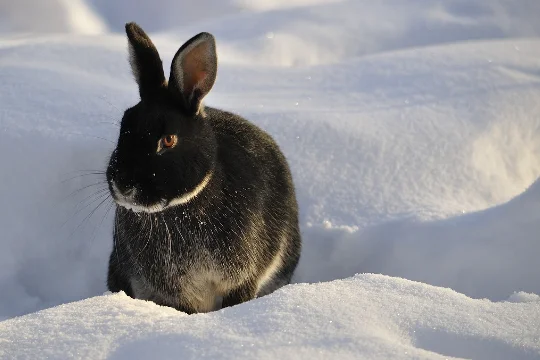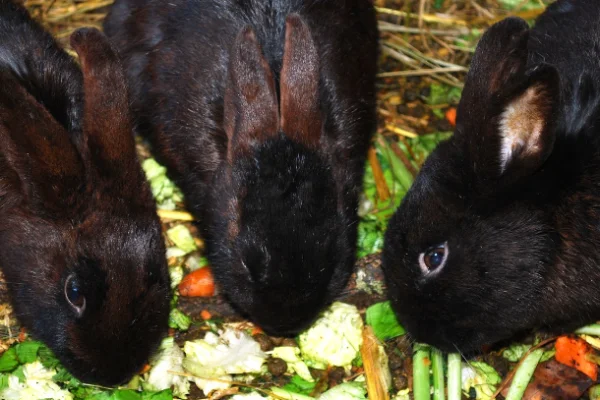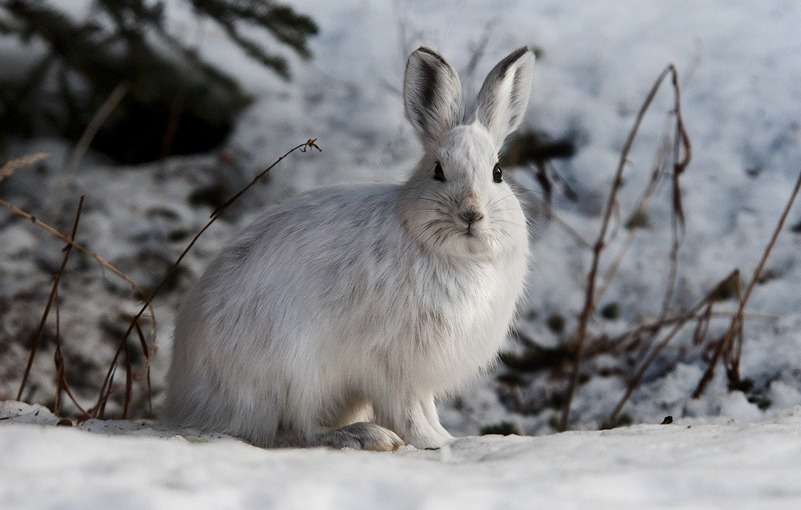Rabbits are one of the most loved animals. These soft, furry animals hopping around in our yards are quite a fun thing to watch. Wild rabbits go through extremely tough times during the winters, with only the strong ones surviving it.
Many animal lovers want to help these poor animals by feeding them during those months when food is scarce. Since the rabbits are wild, it becomes a tough choice as to what to feed them.
Therefore, in this article, we are going to discuss, What Do Wild Bunnies eat in Winter? 10+ Rabbit Foods in Winter. So, without further ado, let’s get going with the article.
What do Wild Bunnies eat in Winter?

Winters are the harshest seasons of all, causing a worldwide scarcity of food, especially in the wild. When the vegetation and other foods get scarce, different animals have different ways of coping up with it.
Since rabbits, unlike bears, do not hibernate or go into their winter sleep, they must constantly look for food to sustain themselves.
In spite of the seeming scarcity of the foods they usually consume, rabbits in the wild are highly good at obtaining maximum nutrients from the minimum food available.
A rabbit consumes anything it can find. They rely on two primary nutrient sources to survive when their preferred vegetation is not readily available.
In the Winter, rabbits eat twigs, branches, saplings, tree bark, shrub buds, pine needles, and other kinds of vegetation.
These, along with bush buds and lower-nutrient bark, constitute its first mode of nutrition. Their cecotropes, which are previously ingested partially digested food, are what make up the second.
By renewing the digestion process of the partially digested food (almost 80%), rabbits manage to extract the maximum nutrients that are available. Sometimes they also ingest their night feces, which help them to get more Vitamin B, essential for their winter survival.
What to Feed Wild Rabbits in Winter?
1) Hays and Grasses
The ideal diet for wild rabbits is thought to consist of hay and grasses. Grass and hay are favorites among wild rabbits because they are nutrient-dense.
They won’t interfere with a rabbit’s digestion because they are readily available in the wild as well. You can feed the wild rabbit a variety of hay, including timothy, alfalfa, meadow, orchard, etc.
2) Vegetables
Wild rabbits are obligate herbivores and can eat a variety of vegetables since they are high in fiber and other critical nutrients that rabbits need. However, giving fruits and vegetables also has certain disadvantages, which we will discuss in the next section.
3) Fruits
You could provide fruits with little to no sugar to rabbits. It is a strict no to give sugary fruits to wild rabbits.
Despite the fact that rabbits are fond of sugary foods, it makes them obese and gives them stomach issues. It is, therefore, best to abstain from providing sugar-rich fruits to rabbits.
4) Pellets
Pet rabbit pellets also make good foods for wild rabbits but can cause certain digestive complications as well. Therefore, a minimal amount of it, with a good mix of grasses and other foods, will help them to easily sustain throughout the winter.
The idea is not to overfeed them and interfere with their natural cycle but to supply them with just the required nutrients necessary for survival in the harsh winters.
5) Water
Since water also gets scarce during the winter months; therefore, placing a water bowl for the bunnies might help them greatly. But remember to maintain it as it can quickly freeze in the environment.
Now it’s up to your budget how you can proceed to maintain the flow of water. There are many ways available on google, and we will discuss the best of them after personally using in the future.
How to feed Wild Rabbits in Winter?

To increase the number of rabbit shelters in your yard, add a brush pile or more shrubs. This will help them to hide from predators during the chilly months. Allow dandelions and other weeds to grow on your lawn during warm months so that rabbits can munch on them.
Sometimes placing feeding stations may attract other unwanted animals like raccoons and possums, for which rabbits might be prey. Also, it might spread diseases among communities that generally stay away from each other in the world.
Do not keep fruits and vegetables for long, out in the open. Raccoons and possums, among other creatures, like other animals, face food scarcity too and might come into your yard.
Besides, over-feeding the rabbits or making it a usual practice is not advised, as this might interfere with the rabbit’s natural instinct to look for wild food and will make them rely on humans.
When giving hay as food, make sure they are fresh. The reason is that old hay is more susceptible to the growth of molds, which might cause several digestive ailments in bunnies. This adorable creature cannot possibly consume everything in your kitchen.
Even though they are a typical part of the human diet, some foods can be poisonous to bunnies. Our everyday food items like cookies, yogurt, bread, avocado, crackers, iceberg lettuce, onions, garlic, shallots, chocolate, oats, and even potatoes can be toxic to wild bunnies.
Therefore, you must refrain from feeding them to these poor creatures.
Alfalfa hay might be rich in calcium, nearly three times that of regular hays, but their excessive feeding can result in bladder stones.
During feeding, we should stay as close to the rabbit’s natural diet as possible, or else it might cause several complications, which will not occur under natural conditions.
10+ Best Rabbit Foods in Winter
- Saplings
- Broccoli
- Carrots
- Spinach
- Twigs
- Pine needles
- Blackberries
- Strawberries
- Cranberries
- Watermelon
- Grapes
Rabbits are extremely good at finding food for themselves, even when the ground is covered with snow. Therefore, unless the food gets extremely scarce, it is advised to refrain from feeding them.
Feeding them will make them rely on humans and will slowly degrade their ability to survive in the wild. Moreover, the diet and other requirements of a pet rabbit and a wild rabbit are quite different and hence, should not be correlated with each other.
Here, we conclude our article on, What Do Wild Bunnies eat in Winter? 10+ Rabbit Foods in Winter. Stay tuned for many more exciting articles.
Also Read:

A zoology student turned writer. Nature has always been a magnet to me, and to unearth some of its secrets through my articles is my prime intention. If not engaging myself with nature and anime content, you can always find me going through some Bengali classics or filling the air with some soulful Tabla beats. An artist, trying to throw some colors to my blank canvas of life.
